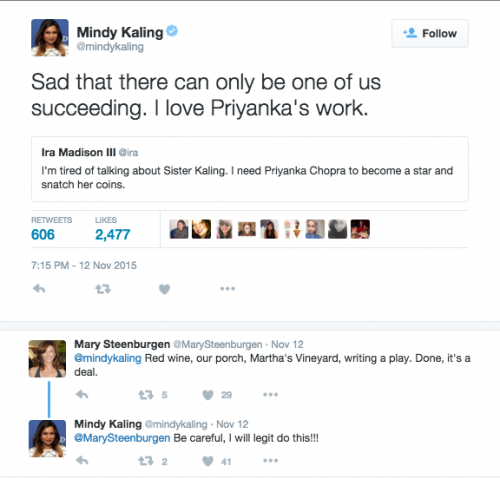
This year has been a big one for South Asians in entertainment. “The Mindy Project” moved to Hulu with a 26-episode deal; Aziz Ansari debuted “Master of None” on Netflix, and well-loved Bollywood star Priyanka Chopra currently stars on ABC’s “Quantico.” As a second-generation immigrant, I’ve never seen this many people who look like me on American television.
In the face of these developments, there is, obviously, risk for comparison. Mindy Kaling recently responded to a tweet wondering when Chopra was going to “become a big star and snatch her coins” (laughable in part because Chopra is already a South Asian household name.)

After Kaling’s response, the tweeter went on to name other critiques of the show, like a lack of minority women behind the scenes and few love interests of color, wondering how Kaling was advancing the plight of minority underrepresentation.
I don’t disagree with his points, but I’m not sure why it was necessary to pit her specifically against another brown actress, especially Chopra, who does not write or produce for her series and cannot serve as an example for increasing diversity. I can understand why his comment put Kaling on the defensive, even if he went on to clarify what he meant.
[Read Related: 19 Times Mindy Kaling Was Just TOO DAMN REAL]
Suggesting that one South Asian’s success can undermine another’s embodies exactly the attitude that Chopra, Kaling, and Ansari are trying to eradicate in their work, which is that minority characters are relegated to a narrowly defined range of roles in entertainment, allowing room for the success of only a few.
The assumption that “only one of us can succeed” stems from a historic lack of well-rounded minority characters on television. Until recently, minority characters fulfilled one-dimensional stereotypes: “set decorations,” as Ansari’s character Dev calls it in “Master of None.” South Asian characters have been written as geeky scientists, laughably ignorant immigrants, or barely comprehensible cab drivers: characters defined by American assumptions about their ethnicities.
The persistence of these characters drastically decreases opportunities for South Asian actors in entertainment, and fewer spots naturally fosters competition. In “Master of None,” both Ansari’s character Dev and his friend Ravi audition for a show about three men, but a network executive refuses to hire both, contending that mainstream audiences won’t watch a series with more than one Indian character.
[Read Related: Aziz Ansari’s ‘Master Of None’ is a Smart, Real and Hilarious Triumph]
Perhaps that would be true if the show was filled with Indian caricatures like Apu from “The Simpsons” or Raj from “The Big Bang Theory,” characters whose overemphasized foreignness makes them not only uninteresting but also unrelatable. However, we are finally starting to see South Asian characters whose main conflict or source of humor isn’t that they’re from another country and have dark skin.
Ansari’s Dev is an actor preoccupied with the trials and tribulations of impending adulthood, Kaling’s protagonist is the subject of rom-com hijinks and relationship woes, and Chopra’s Alex Parrish is an FBI agent trying to clear her own name. All three series allow the subject of ethnicity to arise organically—and remain the focus of a plot-line only transiently—rather than clumsily and repeatedly drawing attention to it with forced accents or clichéd occupations.
Seeing aspects of my heritage on television can be heartwarming—the occasional Indian music in “Master of None,” the shots of dusty Indian roads in “The Mindy Project,” Alex’s hint of an accent. But I also relate to each of these characters outside of our shared ethnicity: I love Dev’s wry observations of millennial habits, Kaling’s penchant for romantic comedies and “warrior names,” Alex’s ambition and stubbornness.
[Read Related: ‘Quantico’ Continues to Leave Audience Wondering ‘Who Did it?’]
These shows have demonstrated that the issue with South Asian characters is not their inherent ethnicity, but the lazy, uninformed writing we have seen in previous shows. When South Asian characters are allowed the complexity and depth that TV has always afforded its white characters, entertainment becomes more inclusive, and success doesn’t need to be for only a few select individuals.
 Meghana Kaloji is a second-year medical student with a B.A. in English literature and an M.A. in public health. She is passionate about narrative medicine, women’s reproductive rights, and the role of social justice in healthcare. Her other obsessions include Parks and Recreation, carrots with hummus, used bookstores, and fuzzy socks.
Meghana Kaloji is a second-year medical student with a B.A. in English literature and an M.A. in public health. She is passionate about narrative medicine, women’s reproductive rights, and the role of social justice in healthcare. Her other obsessions include Parks and Recreation, carrots with hummus, used bookstores, and fuzzy socks.




